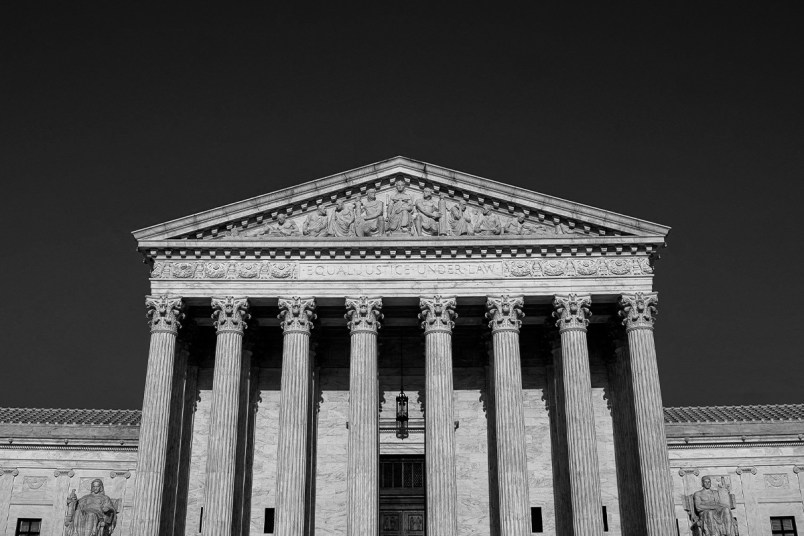The leaked draft opinion that set America aflame Monday night contains more than proof that a majority of Supreme Court justices voted to overturn abortion rights. It’s peppered with hints revealing an openness to outlawing abortion nationwide, always the end game for the core of the anti-abortion movement.
At the very least, it reveals where Justice Samuel Alito, the reported author of the opinion, stands. It’s unclear whether the other conservatives reported to have joined him in the vote — Justices Brett Kavanaugh, Amy Coney Barrett, Neil Gorsuch and Clarence Thomas — signed off on this version of the draft.
The document holds the kind of clues that will not elude those in the rightwing legal space marching towards the next theater in the abortion wars.
‘Privileged Moral Status’
The primary banner under which anti-abortion activists push for a nationwide prohibition of abortion is fetal personhood, the idea that fetuses are imbued with rights under the 14th Amendment.
The once-fringe argument has already permeated the rightwing bloodstream, though we’ve had few data points with which to guess how amenable the justices would be to it. Justice Clarence Thomas seemed receptive in a 2019 concurrence where he cited a belief that abortion is “racial genocide.”
Alito, in the draft opinion, provides more.
People argue, he writes, that fetuses shouldn’t get legal protection until they amass the necessary characteristics to count as a person, naming “sentience, self awareness, the ability to reason.”
After he uses the “some argue” framing to distance himself from that position, he takes it upon himself to rebut the argument personally.
“By this logic, it would be an open question whether even born individuals, including young children or those afflicted with certain developmental or medical conditions, merit protection as ‘persons,’” he writes, employing some classic anti-abortion linguistic maneuvering to compare fetuses to children.
He gets even more explicit.
“But even if one takes the view that ‘personhood’ begins when a certain attribute or combination of attributes is acquired, it is very hard to see why viability should make the point where ‘personhood’ begins,” he writes.
Taking that point to its logical conclusion is exactly what anti-abortion activists promote. If viability is an arbitrary marker of when a fetus’ personhood begins, there’s nothing to stop that point from happening earlier — even, say, at the moment of conception. The Court majority accepting that argument could lead to outlawing abortion as murder nationwide.
Alito then tries to bolster his argument that the viability line is irrational, saying that much of a fetus’ survival outside the womb depends on the caliber of medical treatment it receives, perhaps making viability wholly dependent on geography.
But throughout, what appear to be his pro-fetal personhood leanings are clear.
“If viability is meant to mark a line having universal moral significance, can it be that a fetus that is viable in a big city in the United States has a privileged moral status not enjoyed by an identical fetus in a remote area of a poor country?” he writes.
Historical Precedent
The thread shoots through the whole document.
In a section recounting the history of abortion law, which makes up the bulk of the argument, he claims that there should be no right to abortion because the country did not have one in its early days. He then sneaks in the argument that fetal personhood is actually rooted in the country’s history.
The Solicitor General, he writes, has argued that 19th century law on “quickening” did not regard a fetus “as having a ‘separate and independent existence.’”
“But the case on which the Solicitor General relies for this proposition also suggested that the criminal law’s quickening rule was out of step with the treatment of prenatal life in other areas of law, noting that ‘to many purposes, in reference to civil rights, an infant in ventre sa mere is regarded as a person in being,’” he retorts, quoting the Latin for “in the womb” or “in utero.”
Alito also toys with the idea that pre-quickening abortions were subject to a “proto-felony-murder rule,” undergirding his argument that there is historical precedent for regarding fetuses as people with rights.
Freighted Rhetoric
Elsewhere, Alito reflexively infuses the text with pro-personhood language favored by the anti-abortion movement.
“Roe’s defenders characterize the abortion right as similar to the rights recognized in past decisions involving matters such as intimate sexual relations, contraception, and marriage, but abortion is fundamentally different, as both Roe and Casey acknowleged, because it destroys what those decisions called ‘fetal life’ and what the law now before us describes as an ‘unborn human being,’” he writes.
Later: “What sharply distinguishes the abortion right from the rights recognized in the cases on which Roe and Casey rely is something that both those decisions acknowledged: Abortion destroys what those decisions call ‘potential life’ and what the law at issue in this case regards as the life of an ‘unborn human being,’” he adds.
Unlike his repeated dubious promises that overturning Roe would have no effect on other privacy rights, his disclaimer on fetal personhood gets but a passing parenthetical couched in language praising the conviction of the anti-abortion movement.
“One may disagree with this belief (and our decision is not based on any view about when a State should regard prenatal life as having rights or legally cognizable interests) but even Roe and Casey did not question the good faith of abortion opponents,” he writes.







Well duh, like that was the whole point all along, they made no secret of it.
Ominous tidings for:
Imma catch it, but mmmmmm, 7-11 pizza.
Where’s the logic in his statement? There isn’t any. I’m actually appalled by his assertion. Truthfully I’m so angered that I can’t write.
Time for a walk. Clear the brain.